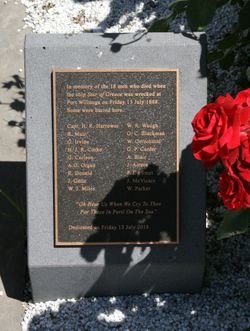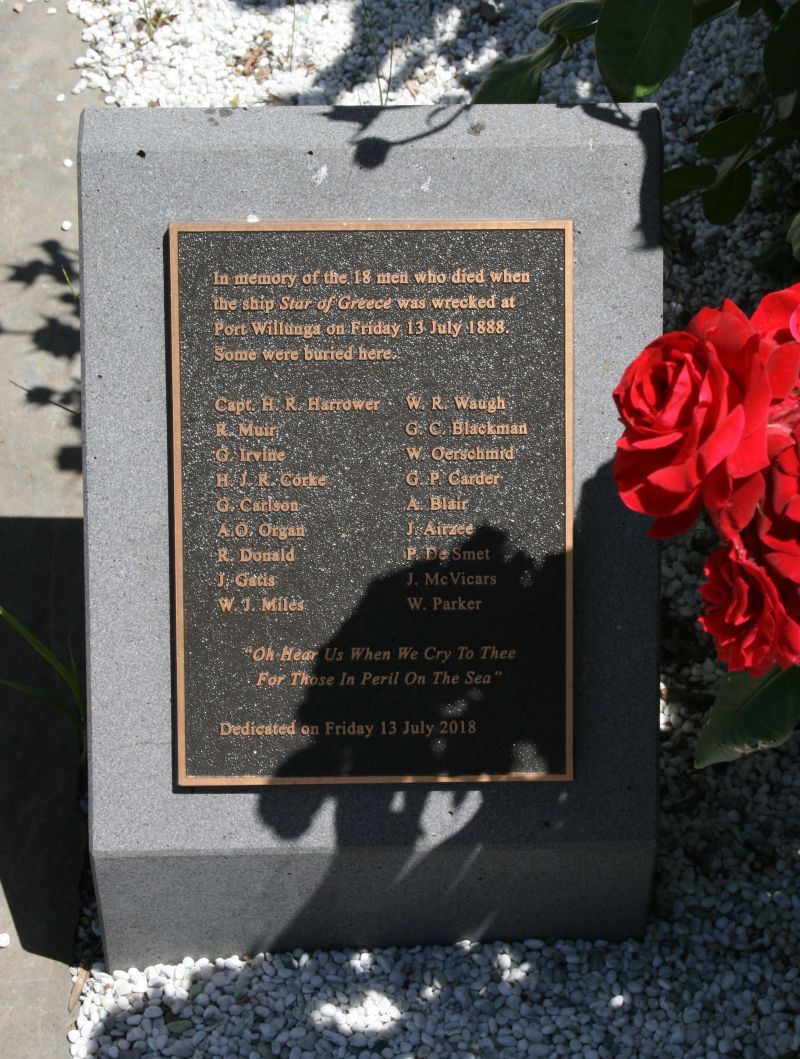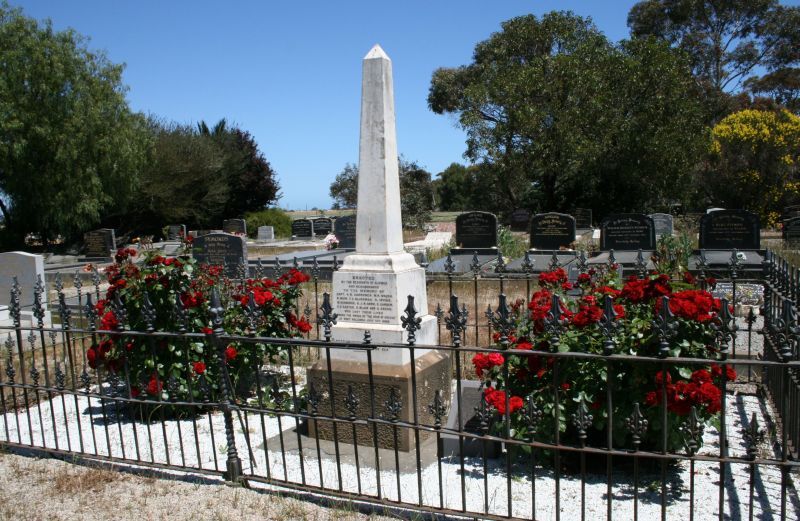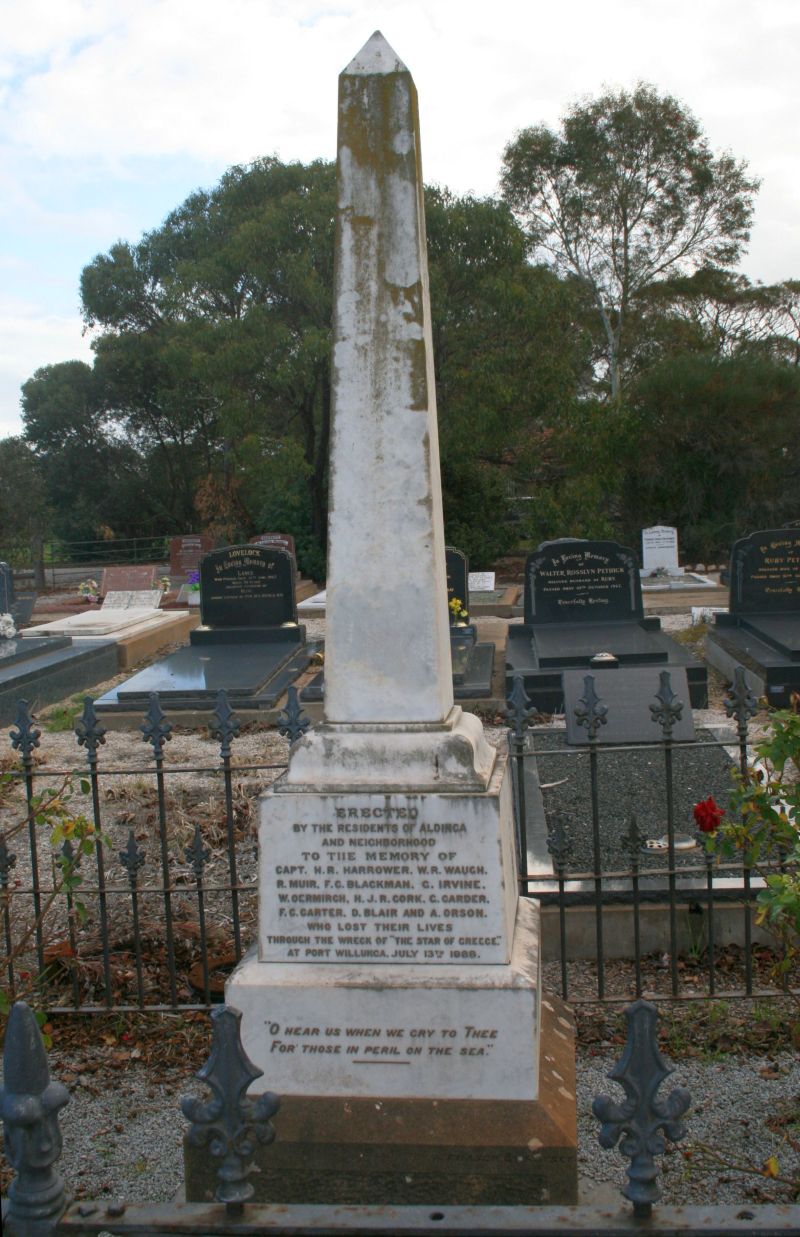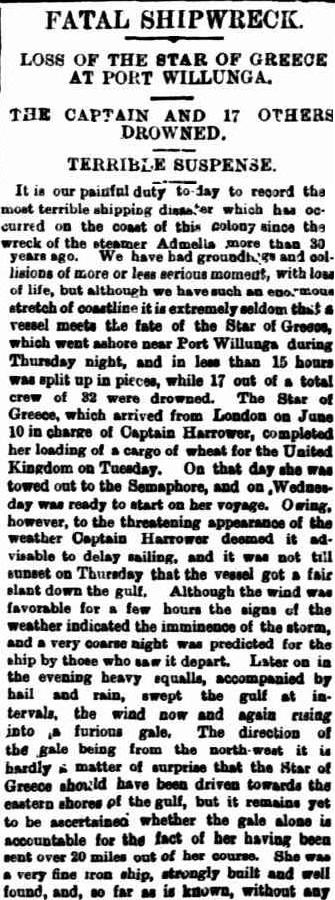The Star of Greece was a 1227-ton, 3 masted iron sailing ship. It was the pride of the Star Shipping Line, which was a British company. After loading her cargo at Port Adelaide, South Australia, she was on a return voyage to Britain with a cargo of 16,002 bags of wheat. Bad weather delayed the departure for half a day, but when the skies cleared the ship set sail. Unfortunately, the storm returned with a vengeance. A freak wave threw the ship into the shallows at Port Willunga and over the next 15 hours the ship broke up. Even though they were a mere 200 yards from land, there was no way to rescue them.
Today the Star of Greece today is one of the most accessible wrecks in South Australia (and one of the most accessible wrecks of a large sailing ship anywhere in the world).
~~~~~~~~~
South Australian Register (Adelaide, SA : 1839-1900). Supplement to the South Australian Register, Monday 23 July 1888 page 2 of 10, column 8:
DEATHS.
HARROWER.- On the 13th July, drowned off Port Willunga, Captain Henry Russell Harrower, fifth son of George Kerr Harrower, grain merchant, late of Dundee, Scotland, and dearly beloved brother of Mrs. James Bishop, of Woodville, and grandson of Captain G K. Harrower, late of the East India Company's Service, aged 29 years.
South Australian Register (Adelaide, SA : 1839-1900). Friday 20 July 1888, page 6 of 8, column 5:
BURIAL OF THE CAPTAIN.
On Wednesday afternoon the remains of Captain Harrower, of the illfated Star of Greece, were buried in the Wesleyan Cemetery at Aldinga. A grave was dug alongside those of the men, and the service was conducted by the Rev. E. K. Miller, of the Anglican Church, Willunga. There was a large attendance of the residents of the neighbourhood, and much genuine sympathy was shown. Mr. Hazeland, the first officer of the Star of Greece, was present. Wreaths were sent by people in the locality, and were deposited on the coffin. Funeral services were conducted at the Church, and at the grave also. Mr. James Bishop, the brother-in-law of deceased, and Mr. T. Anderson, of Glenelg, were among the chief mourners. But for the distance and the short notice other friends would have been present. We are informed that steps are being taken to erect a monument over the graves of the men who were drowned from the wreck. It has been pointed out to us that Trooper Tuohy deserves great credit for his courage and energy in recovering the body of Captain Harrower. He encountered great risk in bringing the body up the cliffs.
The South Australian Advertiser (Adelaide, SA : 1858-1889). Saturday, 14 July 1888, page 5 of 8:
FATAL SHIPWRECK.
LOSS OF THE STAR OF GREECE AT PORT WILLUNGA. THE CAPTAIN AND 17 OTHERS DROWNED. TERRIBLE SUSPENSE.
It is our painful duty to-day to record the most terrible shipping disaster which has occurred on the coast of the colony since the wreck of the steamer Admella more than 30 years ago. We have had groundings and collisions of more or less serious moment, with loss of life, but although we have such an enormous stretch of coastline it is extremely seldom that a vessel meets the fate of the Star of Greece, which went ashore near Port Willunga during Thursday night, and in less than 15 hours was split up in pieces, while 17 out of a total crew of 32 were drowned. The Star of Greece, which arrived from London on June 10 in charge of Captain Harrower, completed her loading of a cargo of wheat for the United Kingdom on Tuesday. On that day she was towed out to the Semaphore, and on Wednesday was ready to start on her voyage. Owing, however, to the threatening appearance of the weather Captain Harrower deemed it ad- visable to delay sailing, and it was not till sunset on Thursday that the vessel got a fair slant down the gulf. Although the wind was favorable for a few hours the signs of the weather indicated the imminence of the storm, and a very coarse might was predicted for the ship by those who saw it depart. Later on in the evening heavy squalls, accompanied by hail and rain, swept the gulf at in- tervals, the wind now and again rising into a furious gale. The direction of the gale being from the north-west it is hardly a matter of surprise that the Star of Greece should have been driven towards the eastern shores of the gulf, but it remains yet to be ascertained whether the gale alone is accountable for the fact of her having been sent over 20 miles out of her course. She was a very fine iron ship, strongly built and well found, and, so far as is known, without any unusual defects in regard to her steering capa- bilities. It is perhaps premature to express a decided opinion as to whether the unfortunate captain, who was one of the victims of the wreck, acted unwisely in making a start in such doubtful weather. It is the opinion, however, of many nautical men that he did so. From the fact that the ship did not strike the reef till about 2 o'clock on Friday morning it may be inferred that for several hours she was battling with the gale, and that it was not for want of great effort that she was unable to keep clear of the coast. Unlike most of the shipping casualties which have occurred of late years on the Australian coast, the Star of Greece met her fate in a terrific gale. From the moment the ship struck the great white reef facing Port Willunga, not only was it certain that she would never be floated again, but there was very little hope for the safety of the crew unless immediate assistance arrived. The sea was so rough that no steamer could live in the vicinity of the reef, and any communication from the shore, which was only 200 yards distant, was rendered almost impracticable except by means of rocket apparatus. Owing, however, to untoward circumstances appliances of this nature could not be got to the ground until too late to be o service. Some idea of the awful character of the experiences of the men during the few hours when the ship was breaking up on the reef may be gathered from the telegraphic account of the wreck which we publish from our special reporters whom we dispatched to the scene. The vivid picture conjured up in the words of the mate who was interviewed by our reporter is calculated to powerfully impress the mind. Some of the unfortunate men who were not, as it may well be thought almost mercifully drowned when the vessel first parted, were seen to be clinging hopelessly to the wreck, washed and buffeted by the waves until the sad struggle with fate terminated in their death. After hanging from the rigging they dropped off one by one, in the hope of swimming to the shore, but only to be drowned. The most powerful swimmer would find it difficult to live in such a sea, and the difficulty became greater in the case of men whose energies were exhausted in the long effort to hold to the wreckage. Some indeed reached the shore, but three were in so exhausted a condition that they died after landing. The total number of saved is 12 and 19 were drowned. The news of the wreck created a profound sensation in the city and at Port Adelaide, but owing to the defective telegraphic arrangements between Aldinga and Willunga the first announcement of it was not made before 9 o'clock, when Mr. T. N. Stephens (secretary of the Marine Board), received word from the Willunga harbormaster that the Star of Greece had driven upon the reef, and that the sea was breaking over her. Then came the following telegram to the secretary:- " Want rocket apparatus to save crew. Sea making clean breach over her. Some of crew in mizzen-rigging. Sea very rough. Masts may go at any moment. Mainroyalmast carried away. Topsails flying." Mr. Stephens at once set about to devise means for rendering assistance to the vessel, but little could be done at that moment except to wire the harbormaster at Normanville, where the nearest set of rocket apparatus is kept, to dispatch it at once to Port Willunga. For some reason or other, however, probably on account of the inability of the harbormaster to obtain a good vehicle and horses, or because of a bad road, the apparatus did not reach its destination till about 5 o'clock. Meanwhile intense interest was felt in the matter, and enquiries were eagerly made as to how the unfortunate seamen were faring. Before noon the secretary received word that the mizen rigging had gone overboard, and that only one man was yet saved. Then came the following telegram:- " Another man has been saved, but four others who were in the mizen rigging were drowned. They have constructed a raft, and are trying to open communication with the ship. The men forward are trying to float a line to the shore. The sea is very heavy, and the ill-fated vessel is bound to go to pieces to-night." The following message was received a little later:-" Star of Greece lying about 200 yards from the beach. Four men drowned and one saved. About 20 more in a perilous condition remaining on board. Wind high. Cannot give any assistance. If help is not sent all hands will be lost." From the first, owing to the bad weather and heavy sea, it was considered unlikely that a steamer would be of any service, but it was thought better to send one, and accordingly at about midday Mr. Stephens and Mr. W. R. Cave interviewed the Treasurer, and received instructions to send the steamer Defiance, a fast vessel of about 60 tons, to the scene of the wreck. She left the Semaphore at about 2.30 for the scene of the wreck, and had a very rough and tempestuous passage down the coast. The wind was blowing a regular gale from the north west, and seas continually washing over the deck made it most uncomfortable for those on board. The steamer reached her destination about 5 o'clock. Nothing could be seen of the wreck, however, for certain although Captain Amora, who was in charge of the Defiance, saw some object about a mile away surrounded by foaming waves, which he thought must be the ill-fated vessel. No assistance could be rendered from the steamer, which indeed had enough to do to look after her own safety, and after waiting about a short time she returned to the Semaphore about 9 p.m., after another unpleasant passage back again. The steamtug Yatala was also dis- patched during the afternoon, but returned late at night, having found it quite impossible to do anything. Indeed, as it turned out, by the time the Yatala reached Willunga not a man remained on board the wreck. In the morning Mr. Stephens dispatched Captain Inglis (the Port Adelaide harbor- master) to Willunga, and he superintended the operations in rendering assistance. Late in the afternoon Mr. Stephens received the following telegram from Captain Inglis:-"Ten men saved ; two on board; rest all drowned in trying to swim ashore. If they had stopped by the vessel would probably have been saved, except those who went when the ship parted. Vessel half a mile north of Willunga jetty. Captain lost when ship parted; mate and third mate saved. Signalled not to leave the vessel, but took no notice. Three died after getting ashore. Some of the men are naked. What is to be done with them ? All is being done that can be done." The secretary replied-" Do everything possible that will ensure the comfort and welfare of the distressed seamen, and have them housed and attended to in the best and most convenient manner." Many of the warehouses and shipping offices at Port Adelaide, on the receipt of the tragic news, lowered their flags to half- mast, and the disaster cast a deep gloom over the town. The captain (a young man of 29 years of age) was well known, and considered an able seaman. He had no relatives in the colony except a sister, who is married to Mr. Bishop, of the Adelaide Steamship Company. The great majority of the seamen (in fact all the A.B.'s) shipped from Port Adelaide, and were consequently known throughout the district, some of them having relatives here.
The Star of Greece was a 1227-ton, 3 masted iron sailing ship. It was the pride of the Star Shipping Line, which was a British company. After loading her cargo at Port Adelaide, South Australia, she was on a return voyage to Britain with a cargo of 16,002 bags of wheat. Bad weather delayed the departure for half a day, but when the skies cleared the ship set sail. Unfortunately, the storm returned with a vengeance. A freak wave threw the ship into the shallows at Port Willunga and over the next 15 hours the ship broke up. Even though they were a mere 200 yards from land, there was no way to rescue them.
Today the Star of Greece today is one of the most accessible wrecks in South Australia (and one of the most accessible wrecks of a large sailing ship anywhere in the world).
~~~~~~~~~
South Australian Register (Adelaide, SA : 1839-1900). Supplement to the South Australian Register, Monday 23 July 1888 page 2 of 10, column 8:
DEATHS.
HARROWER.- On the 13th July, drowned off Port Willunga, Captain Henry Russell Harrower, fifth son of George Kerr Harrower, grain merchant, late of Dundee, Scotland, and dearly beloved brother of Mrs. James Bishop, of Woodville, and grandson of Captain G K. Harrower, late of the East India Company's Service, aged 29 years.
South Australian Register (Adelaide, SA : 1839-1900). Friday 20 July 1888, page 6 of 8, column 5:
BURIAL OF THE CAPTAIN.
On Wednesday afternoon the remains of Captain Harrower, of the illfated Star of Greece, were buried in the Wesleyan Cemetery at Aldinga. A grave was dug alongside those of the men, and the service was conducted by the Rev. E. K. Miller, of the Anglican Church, Willunga. There was a large attendance of the residents of the neighbourhood, and much genuine sympathy was shown. Mr. Hazeland, the first officer of the Star of Greece, was present. Wreaths were sent by people in the locality, and were deposited on the coffin. Funeral services were conducted at the Church, and at the grave also. Mr. James Bishop, the brother-in-law of deceased, and Mr. T. Anderson, of Glenelg, were among the chief mourners. But for the distance and the short notice other friends would have been present. We are informed that steps are being taken to erect a monument over the graves of the men who were drowned from the wreck. It has been pointed out to us that Trooper Tuohy deserves great credit for his courage and energy in recovering the body of Captain Harrower. He encountered great risk in bringing the body up the cliffs.
The South Australian Advertiser (Adelaide, SA : 1858-1889). Saturday, 14 July 1888, page 5 of 8:
FATAL SHIPWRECK.
LOSS OF THE STAR OF GREECE AT PORT WILLUNGA. THE CAPTAIN AND 17 OTHERS DROWNED. TERRIBLE SUSPENSE.
It is our painful duty to-day to record the most terrible shipping disaster which has occurred on the coast of the colony since the wreck of the steamer Admella more than 30 years ago. We have had groundings and collisions of more or less serious moment, with loss of life, but although we have such an enormous stretch of coastline it is extremely seldom that a vessel meets the fate of the Star of Greece, which went ashore near Port Willunga during Thursday night, and in less than 15 hours was split up in pieces, while 17 out of a total crew of 32 were drowned. The Star of Greece, which arrived from London on June 10 in charge of Captain Harrower, completed her loading of a cargo of wheat for the United Kingdom on Tuesday. On that day she was towed out to the Semaphore, and on Wednesday was ready to start on her voyage. Owing, however, to the threatening appearance of the weather Captain Harrower deemed it ad- visable to delay sailing, and it was not till sunset on Thursday that the vessel got a fair slant down the gulf. Although the wind was favorable for a few hours the signs of the weather indicated the imminence of the storm, and a very coarse might was predicted for the ship by those who saw it depart. Later on in the evening heavy squalls, accompanied by hail and rain, swept the gulf at in- tervals, the wind now and again rising into a furious gale. The direction of the gale being from the north-west it is hardly a matter of surprise that the Star of Greece should have been driven towards the eastern shores of the gulf, but it remains yet to be ascertained whether the gale alone is accountable for the fact of her having been sent over 20 miles out of her course. She was a very fine iron ship, strongly built and well found, and, so far as is known, without any unusual defects in regard to her steering capa- bilities. It is perhaps premature to express a decided opinion as to whether the unfortunate captain, who was one of the victims of the wreck, acted unwisely in making a start in such doubtful weather. It is the opinion, however, of many nautical men that he did so. From the fact that the ship did not strike the reef till about 2 o'clock on Friday morning it may be inferred that for several hours she was battling with the gale, and that it was not for want of great effort that she was unable to keep clear of the coast. Unlike most of the shipping casualties which have occurred of late years on the Australian coast, the Star of Greece met her fate in a terrific gale. From the moment the ship struck the great white reef facing Port Willunga, not only was it certain that she would never be floated again, but there was very little hope for the safety of the crew unless immediate assistance arrived. The sea was so rough that no steamer could live in the vicinity of the reef, and any communication from the shore, which was only 200 yards distant, was rendered almost impracticable except by means of rocket apparatus. Owing, however, to untoward circumstances appliances of this nature could not be got to the ground until too late to be o service. Some idea of the awful character of the experiences of the men during the few hours when the ship was breaking up on the reef may be gathered from the telegraphic account of the wreck which we publish from our special reporters whom we dispatched to the scene. The vivid picture conjured up in the words of the mate who was interviewed by our reporter is calculated to powerfully impress the mind. Some of the unfortunate men who were not, as it may well be thought almost mercifully drowned when the vessel first parted, were seen to be clinging hopelessly to the wreck, washed and buffeted by the waves until the sad struggle with fate terminated in their death. After hanging from the rigging they dropped off one by one, in the hope of swimming to the shore, but only to be drowned. The most powerful swimmer would find it difficult to live in such a sea, and the difficulty became greater in the case of men whose energies were exhausted in the long effort to hold to the wreckage. Some indeed reached the shore, but three were in so exhausted a condition that they died after landing. The total number of saved is 12 and 19 were drowned. The news of the wreck created a profound sensation in the city and at Port Adelaide, but owing to the defective telegraphic arrangements between Aldinga and Willunga the first announcement of it was not made before 9 o'clock, when Mr. T. N. Stephens (secretary of the Marine Board), received word from the Willunga harbormaster that the Star of Greece had driven upon the reef, and that the sea was breaking over her. Then came the following telegram to the secretary:- " Want rocket apparatus to save crew. Sea making clean breach over her. Some of crew in mizzen-rigging. Sea very rough. Masts may go at any moment. Mainroyalmast carried away. Topsails flying." Mr. Stephens at once set about to devise means for rendering assistance to the vessel, but little could be done at that moment except to wire the harbormaster at Normanville, where the nearest set of rocket apparatus is kept, to dispatch it at once to Port Willunga. For some reason or other, however, probably on account of the inability of the harbormaster to obtain a good vehicle and horses, or because of a bad road, the apparatus did not reach its destination till about 5 o'clock. Meanwhile intense interest was felt in the matter, and enquiries were eagerly made as to how the unfortunate seamen were faring. Before noon the secretary received word that the mizen rigging had gone overboard, and that only one man was yet saved. Then came the following telegram:- " Another man has been saved, but four others who were in the mizen rigging were drowned. They have constructed a raft, and are trying to open communication with the ship. The men forward are trying to float a line to the shore. The sea is very heavy, and the ill-fated vessel is bound to go to pieces to-night." The following message was received a little later:-" Star of Greece lying about 200 yards from the beach. Four men drowned and one saved. About 20 more in a perilous condition remaining on board. Wind high. Cannot give any assistance. If help is not sent all hands will be lost." From the first, owing to the bad weather and heavy sea, it was considered unlikely that a steamer would be of any service, but it was thought better to send one, and accordingly at about midday Mr. Stephens and Mr. W. R. Cave interviewed the Treasurer, and received instructions to send the steamer Defiance, a fast vessel of about 60 tons, to the scene of the wreck. She left the Semaphore at about 2.30 for the scene of the wreck, and had a very rough and tempestuous passage down the coast. The wind was blowing a regular gale from the north west, and seas continually washing over the deck made it most uncomfortable for those on board. The steamer reached her destination about 5 o'clock. Nothing could be seen of the wreck, however, for certain although Captain Amora, who was in charge of the Defiance, saw some object about a mile away surrounded by foaming waves, which he thought must be the ill-fated vessel. No assistance could be rendered from the steamer, which indeed had enough to do to look after her own safety, and after waiting about a short time she returned to the Semaphore about 9 p.m., after another unpleasant passage back again. The steamtug Yatala was also dis- patched during the afternoon, but returned late at night, having found it quite impossible to do anything. Indeed, as it turned out, by the time the Yatala reached Willunga not a man remained on board the wreck. In the morning Mr. Stephens dispatched Captain Inglis (the Port Adelaide harbor- master) to Willunga, and he superintended the operations in rendering assistance. Late in the afternoon Mr. Stephens received the following telegram from Captain Inglis:-"Ten men saved ; two on board; rest all drowned in trying to swim ashore. If they had stopped by the vessel would probably have been saved, except those who went when the ship parted. Vessel half a mile north of Willunga jetty. Captain lost when ship parted; mate and third mate saved. Signalled not to leave the vessel, but took no notice. Three died after getting ashore. Some of the men are naked. What is to be done with them ? All is being done that can be done." The secretary replied-" Do everything possible that will ensure the comfort and welfare of the distressed seamen, and have them housed and attended to in the best and most convenient manner." Many of the warehouses and shipping offices at Port Adelaide, on the receipt of the tragic news, lowered their flags to half- mast, and the disaster cast a deep gloom over the town. The captain (a young man of 29 years of age) was well known, and considered an able seaman. He had no relatives in the colony except a sister, who is married to Mr. Bishop, of the Adelaide Steamship Company. The great majority of the seamen (in fact all the A.B.'s) shipped from Port Adelaide, and were consequently known throughout the district, some of them having relatives here.
Family Members
Advertisement
Records on Ancestry
Advertisement
